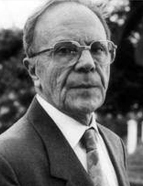

Joel Serrão was born on 12 December 1919 in Santo António, Funchal, where he completed his secondary schooling. Little is known about his social background other than that his family was not wealthy. Sensitive to the role of geography in the understanding of societies, he reflected on his own youth in Madeira. He felt he had been subjected to a two-sided insularity, not only physical and social but also a “psychological insularity” (Jornal de Letras, 31-01-1989, p.16), which had sparked his interest in reading, and his initial contact with the work of António Sérgio as a young adult. Joel Serrão was drawn into the apostleship of António Sérgio as a young disciple who, in a period prone to despair and anxiety – against the background of the Spanish Civil War and a time when the ideological tentacles of the Estado Novo [New State] had also begun to entangle the young – encountered “the path towards hope” in Antigoneand the Essays (Portugueses somos [Portuguese we are], 1975, 75-76).
In Lisbon, his period at the Faculdade de Letras [Faculty of Arts] (1939-46) was “devoid of hope”, a waste of time, save for very few exceptions such as the teachings of Vieira de Almeida, Delfim Santos and Magalhães Godinho (Os anos 40 na arte portuguesa, [The 1940s in Portuguese Art] vol. 6, 1982, 14-15; Portugueses somos, 77). This negative view of the Faculty was shared by other students such as Mário Soares, José-Augusto França and Magalhães Godinho. To the detriment of the “old Convento de Jesus [Convent of Jesus]” he frequented the “autodidactic university of café tertulias” where António Sérgio’s pedagogy marked its presence. Once again, António Sérgio represented hope in the face of another type of insularity; in Serrão's words, he “leavened our dreams and life projects” (Portugueses somos, 77).
It was within this context of rejection towards the university institution that Horizonte, a university journal, emerged in 1942, of which Joel Serrano was both director and active collaborator. It was, according to Mário Soares, a vehicle for “genuine cultural aspirations” (Portugal Amordaçado [Gagged Portugal], 1974, 43), led by young people with a new vision for national culture.
